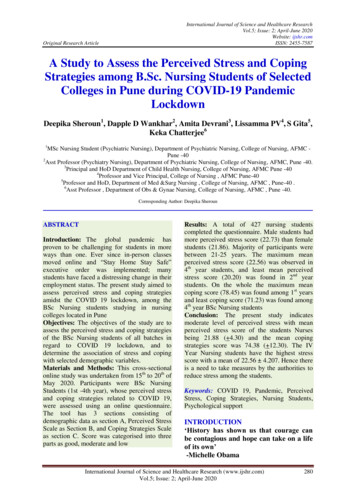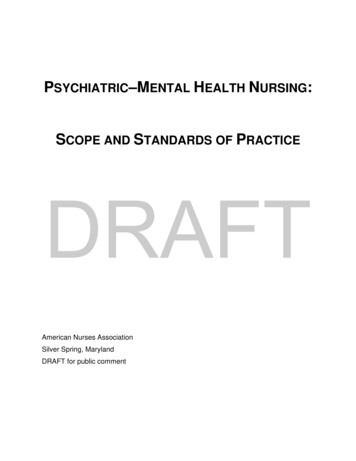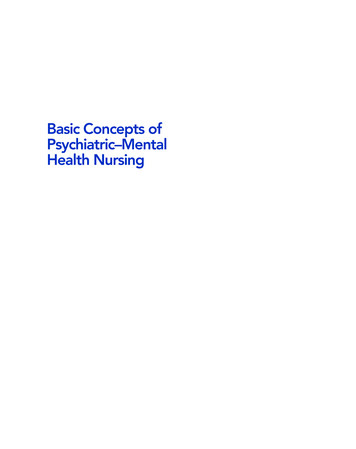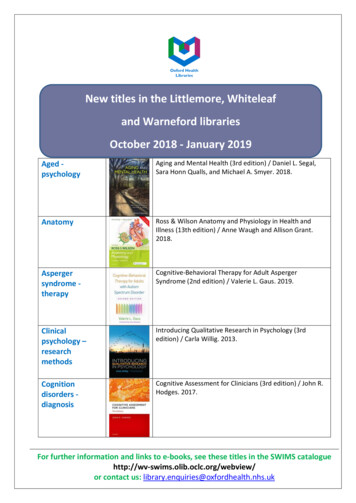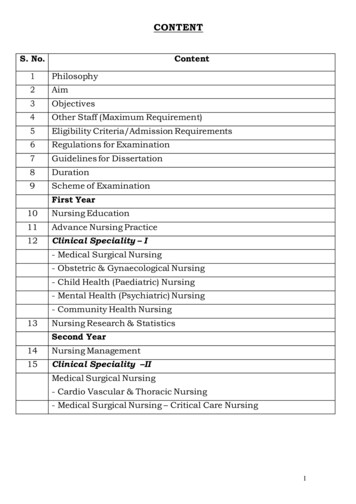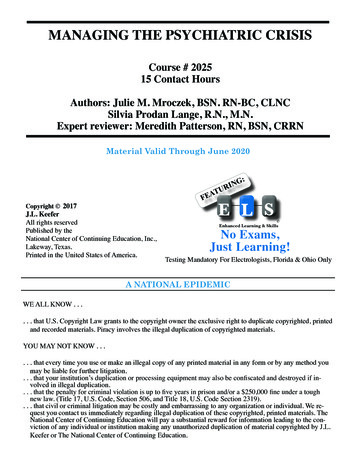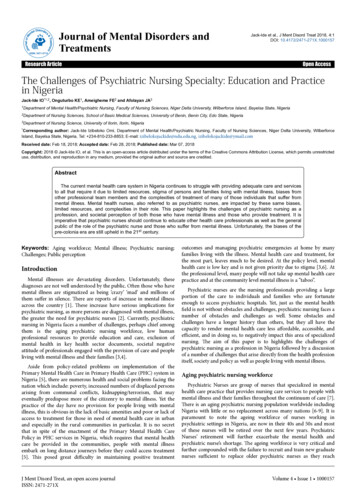
Transcription
Journal of Mental Disorders andTreatmentsreatment&Turnal of MeJosoal Di rdersntISSN: 2471-271XJack-Ide et al., J Ment Disord Treat 2018, 4:1DOI: 10.4172/2471-271X.1000157Research ArticleOpen AccessThe Challenges of Psychiatric Nursing Specialty: Education and Practicein NigeriaJack-Ide IO*1,2, Onguturbo KE1, Ameigheme FE2 and Afolayan JA31Departmentof Mental Health/Psychiatric Nursing, Faculty of Nursing Sciences, Niger Delta University, Wilberforce Island, Bayelsa State, Nigeria2Departmentof Nursing Sciences, School of Basic Medical Sciences, University of Benin, Benin City, Edo State, Nigeria3Departmentof Nursing Science, University of Ilorin, Ilorin, Nigeria*Correspondingauthor: Jack-Ide Izibeloko Omi, Department of Mental Health/Psychiatric Nursing, Faculty of Nursing Sciences, Niger Delta University, WilberforceIsland, Bayelsa State, Nigeria, Tel: 234-810-233-8853; E-mail: izibelokojackide@ndu.edu.ng, izibelokojackide@ymail.comReceived date: Feb 18, 2018; Accepted date: Feb 28, 2018; Published date: Mar 07, 2018Copyright: 2018 Jack-Ide IO, et al. This is an open-access article distributed under the terms of the Creative Commons Attribution License, which permits unrestricteduse, distribution, and reproduction in any medium, provided the original author and source are credited.AbstractThe current mental health care system in Nigeria continues to struggle with providing adequate care and servicesto all that require it due to limited resources, stigma of persons and families living with mental illness, biases fromother professional team members and the complexities of treatment of many of those individuals that suffer frommental illness. Mental health nurses, also referred to as psychiatric nurses, are impacted by these same biases,limited resources, and complexities in their role. This paper highlights the challenges of psychiatric nursing as aprofession, and societal perception of both those who have mental illness and those who provide treatment. It isimperative that psychiatric nurses should continue to educate other health care professionals as well as the generalpublic of the role of the psychiatric nurse and those who suffer from mental illness. Unfortunately, the biases of thepre-colonia era are still upheld in the 21st century.Keywords: Aging workforce; Mental illness; Psychiatric nursing;Challenges; Public perceptionIntroductionMental illnesses are devastating disorders. Unfortunately, thesediagnoses are not well understood by the public. Often those who havemental illness are stigmatized as being ‘crazy’ ‘mad’ and millions ofthem suffer in silence. There are reports of increase in mental illnessacross the country [1]. These increase have serious implications forpsychiatric nursing, as more persons are diagnosed with mental illness,the greater the need for psychiatric nurses [2]. Currently, psychiatricnursing in Nigeria faces a number of challenges, perhaps chief amongthem is the aging psychiatric nursing workforce, low humanprofessional resources to provide education and care, exclusion ofmental health in key health sector documents, societal negativeattitude of professionals engaged with the provision of care and peopleliving with mental illness and their families [3,4].Aside from policy-related problems on implementation of thePrimary Mental Health Care in Primary Health Care (PHC) system inNigeria [5], there are numerous health and social problems facing thenation which include: poverty, increased numbers of displaced personsarising from communal conflicts, kidnapping/terrorism, that mayeventually predispose more of the citizenry to mental illness. Yet thepractice of the day have no provision for people living with mentalillness, this is obvious in the lack of basic amenities and poor or lack ofaccess to treatment for those in need of mental health care in urbanand especially in the rural communities in particular. It is no secretthat in spite of the enactment of the Primary Mental Health CarePolicy in PHC services in Nigeria, which requires that mental healthcare be provided in the communities, people with mental illnessembark on long distance journeys before they could access treatment[5]. This posed great difficulty in maintaining positive treatmentJ Ment Disord Treat, an open access journalISSN: 2471-271Xoutcomes and managing psychiatric emergencies at home by manyfamilies living with the illness. Mental health care and treatment, forthe most part, leaves much to be desired. At the policy level, mentalhealth care is low key and is not given priority due to stigma [3,6]. Atthe professional level, many people will not take up mental health carepractice and at the community level mental illness is a “taboo”.Psychiatric nurses are the nursing professionals providing a largeportion of the care to individuals and families who are fortunateenough to access psychiatric hospitals. Yet, just as the mental healthfield is not without obstacles and challenges, psychiatric nursing faces anumber of obstacles and challenges as well. Some obstacles andchallenges have a longer history than others, but they all have thecapacity to render mental health care less affordable, accessible, andefficient, and in doing so, to negatively impact this area of specializednursing. The aim of this paper is to highlights the challenges ofpsychiatric nursing as a profession in Nigeria followed by a discussionof a number of challenges that arise directly from the health professionitself, society and policy as well as people living with mental illness.Aging psychiatric nursing workforcePsychiatric Nurses are group of nurses that specialized in mentalhealth care practice that provides nursing care services to people withmental illness and their families throughout the continuum of care [7].There is an aging psychiatric nursing population worldwide includingNigeria with little or no replacement across many nations [6-9]. It isparamount to note the ageing workforce of nurses working inpsychiatric settings in Nigeria, are now in their 40s and 50s and mostof these nurses will be retired over the next few years. PsychiatricNurses’ retirement will further exacerbate the mental health andpsychiatric nurse’s shortage. The ageing workforce is very critical andfurther compounded with the failure to recruit and train new graduatenurses sufficient to replace older psychiatric nurses as they reachVolume 4 Issue 1 1000157
Citation:Jack-Ide IO, Onguturbo KE, Ameigheme FE, Afolayan JA (2018) The Challenges of Psychiatric Nursing Specialty: Education andPractice in Nigeria. J Ment Disord Treat 4: 157. doi:10.4172/2471-271X.1000157Page 2 of 5retirement. Older, experienced psychiatric nurses are also essential toprovide mentoring for inexperienced young psychiatric nurses cominginto the workforce. The current aging psychiatric nursing workforcewill soon retire with all their wealth of experiences (Table 1). Theshortage of experienced nurses affects not only quality of care providedbut also mentoring of new graduates and inexperienced nurses into thepsychiatric nursing workforce.VariableThe current shortage of nurses in mental health facilities makes itinevitable that a considerable number of persons with mental illnessmay not access care. Heyman et al. [12] reported that psychiatricnursing recruitment proves difficult and that appreciation of the skillsand roles of psychiatric nurses is low. Situational analysis in one of thefacilities in the Niger Delta region shows over 70% of nurses workingin the psychiatric facility will retire within the next few years with noreplacement. Previously, there were direct effort by government tosponsor people to train in psychiatry and psychiatric nursing specialty.One of the state’s Ministry of Health and Hospitals Management Boardin the region in the 1980’s use to recruit and sponsor people fortraining within and outside the country and after completion of suchprogrammes, they are posted to the psychiatric facility. However, overthe past 25 years there has been no such recruitment or training as theprogramme was discontinued due to economic meltdown. Theseincentives attracted many people into this specialty but over the yearsthere is no more sponsorship hence people are not willing to take-uppsychiatric nursing as a carrier due to stigma and perceived workhazard. Therefore the need for policy makers to motivate and attractpeople to take-up career in psychiatric nursing and other mental healthprofession by providing incentives and a stimulating environment fortraining and practice (Table 2).Frequency (N 75)%25-3022.731-356836-4045.346-50152051 and above4864Male3546.7Female4053.3Director of Nursing Services11.3Deputy Directors1824Chief Nursing Officers4661.3Othermedicaldoctorsspecialized in psychiatry)Principal Nursing Officers810.7Nursing Officer 122.7AgeGenderCategories of NursesWorking Experience10-15 years22.716-20 years45.321-25 years121626-30 years2229.331 and above3546.7Table 1: Psychiatric Nurses working in one of the psychiatric facilitiesin the Niger Delta Region.Psychiatric Nursing Human Resource RecruitmentPoor human resources for psychiatric nursing care in Nigeriacontribute to poor population mental health in the country [4]. InNigeria, as in most sub-Saharan African countries [10,11] there is agross inadequacy of psychiatric nurses. For example, Nigeria has about2.41 per 100,000 populations to a population of over 170 million.Almost all of these nurses work in big psychiatric hospitals located inurban cities leaving the vast majority of the rural community with noservice. Despite the centrality of the psychiatric nurse’s role inaddressing the unique needs of persons with mental illness, there hasbeen a limited focus on the recruitment and retention of these nursesand other mental health professionals.J Ment Disord Treat, an open access journalISSN: 2471-271XMental Healthcare ProfessionalsNigeriaSouth AfricaMozambiquePsychiatric nurses2.4110.080.17Psychiatrists0.150.2800.4(not 0.490.450.00Psychologists0.070.320.42Social workers0.120.40.03Occupational therapists0.050.130.09Other health workers8.030.280.94Table 2: Median estimate of mental healthcare professionals working inmental health facilities per 100,000 populations in Nigeria compared totwo other African Countries.Low Preference of Psychiatric Nursing PracticeWhile the public’s perception of psychiatric nurses is not alwaysfavorable, other specialty in the nursing profession also viewspsychiatric nurses as inferior and not real nurses, less desirable careerchoice compared with other nursing specialty, and that psychiatricnurses behave like their patients i.e. crazy [13]. In recent times, there isdrastic reduction of young nursing students taking up psychiatricnursing practice in Nigeria. There is limited literature reporting on theattitudes of nursing students towards psychiatry and their reasons fornot choosing psychiatric nursing as a career in Nigeria.In a study of undergraduate nursing students’ attitude towardspsychiatry and psychiatric nursing as a career choice in the Niger Deltaregion of Nigeria [13], it was reported that psychiatric nursing clinicalposting experience has a positive attitude on students nursesperception of the profession and people with mental illness. However,on the students’ preference on area of specialization show that only5.7% of the students were willing to pursue psychiatric nursing as acareer. This was similar to the study conducted by Hunter [14] in aVolume 4 Issue 1 1000157
Citation:Jack-Ide IO, Onguturbo KE, Ameigheme FE, Afolayan JA (2018) The Challenges of Psychiatric Nursing Specialty: Education andPractice in Nigeria. J Ment Disord Treat 4: 157. doi:10.4172/2471-271X.1000157Page 3 of 5university in a large city in the Midwestern US on nursing students’attitudes about psychiatric nursing show few of the participants agreedthat psychiatric nursing clinical experience prepares them to work aspsychiatric nurses, yet none of the students planned to pursue career inpsychiatric nursing. In another study by Hoekstra et al. [15] on nursingcareer in mental health care: choices and motives of nursing studentsrevealed that nursing students have stereotype, mostly negativeperceptions of mental illness and psychiatric nursing as a career.Furthermore, student nurses are also aware of how other health teammembers view psychiatric nurses, not just by the public, but by thosein other nursing specialty as well. Undoubtedly, that leads somestudents’ nurses who want to be “real” nurses into other nursingspecialty. It is critical that nursing programs develop strategies toprepare nurses for meeting the mental health needs of clients as well asencouraging students to consider this area of practice.Psychiatric nursing human resource for undergraduateprogrammesChallenges to psychiatric nursing occur in a number of arenas,including the classroom where nursing students are first introduced tothe various areas of psychiatric nursing. In many instances, it iscertainly not uncommon to see some of the psychiatric curriculumbeing taught by nurse educators with little or no experience oracademic preparation in psychiatric nursing. The practices of the useof non-psychiatric nurses to teach psychiatric nursing do not serve theprofession well [16,17]. It is more beneficial and enriching to useexperienced psychiatric nurse educators to teach the necessarypsychiatric nursing curriculum and share experiences.The belief that mental health is an easy topic and that everyone havepersonal emotional experiences as such, qualifies him/her to teach.Then it can be said of having a ‘square peg in a round hole’.Unfortunately, what is communicated to the students is a lecture withlittle depth by someone with no experience to share with the students.Consequently the inexperienced teacher would rather present anunrealistic and unpleasant picture about people living with mentalillness and the profession, thereby robbing young nursing graduates ofmaking a career in psychiatric nursing specialty. Happell [18]emphases the importance of how theory and practice of mental healthand psychiatric nursing should be presented to students, as to avoidbiases against the profession. This is of particular importance indetermining their future career choice. Nursing education mustreinforce the importance of psychiatric nursing and demand forintelligent, imaginative psychiatric nurse educators capable ofdelivering required experiences and knowledge to nursing studentscannot be overstated.StigmaStigma has been defined as the combined effect of prejudice,ignorance and discrimination [19,20]. Stigma associated with mentalillness has been described as the main obstacle to the provision ofmental health care service. Society holds outdated beliefs about mentalillness [21,22]. A central theme of stigma of mental illness is aperception that persons with mental illness are dangerous,unpredictable, incompetent and not only in control of the illness butthey caused it [23]. Psychiatric nurses and other mental healthcareprofessionals taking care of the patients also experience ‘stigma byassociation’ [21,24]. Such ‘stigma by association’ also appears to exist inthe form of attributing negative characteristics to psychiatric nurses. Incomparison to nurses in other specialty areas, psychiatric nurses wereJ Ment Disord Treat, an open access journalISSN: 2471-271Xseen as the least liable ‘to be described as skilled, logical, dynamic andrespected’ [21]. Given these depictions, it should not be surprising thatpsychiatric nursing was found to be among the least favoured of thespecialty areas in nursing, with relatively few nurses interested inmaking a career in this area of practice [14,15,17].As long as this stigma exists, the possibility of consumers of mentalhealth services receiving optimal care may be severely diminished, as isthe vision on the other hand of psychiatric nursing as a satisfying,worthwhile area of practice [25,26].The dearth of mental health care facilitiesOne of the major challenges in treating mental illness in Nigeria isthe dearth of mental health care facilities in urban cities and rural areasin particularly, makes it inevitable that a considerable amount ofmental illness care is provided in the non-mental health care sector[27,28]. Moreover, access to psychiatric care services seems difficult asmost of the hospitals are regionally located in urban cities and any oneof such facility across the nation is expected to be a catchment area fora population of over 8-10 million. The low-income groups in bothurban and rural areas who access care through mental health facilitiesare therefore at greater risk of not receiving the needed care [29].Others who are unable to access these hospitals, about 70% ofNigerians will receive treatment from traditional healers, spiritualist,faith healing and complementary medicine, the use of which iswidespread in most communities [30,31]. The treatment gap forpersons with mental illness who did not receive any treatment in thepreceding 12 months due to the absence of mental health care servicesis estimated at 80% in Nigeria [30]. In another large-scaleepidemiological study [32] conducted in several countries (includingNigeria) have shown that only about 20% of persons with mentalhealth disorders had received any treatment in the prior 12 months.Among those who did, only 10% received minimally adequatetreatment. Creating mental health units in health centres, and postingof psychiatric nurses to these facilities in the communities willsignificantly reduce the problem of institutionalizing mental healthcare, and increase access for people with mental illness therebyreducing the illness burden on many families.Cultural belief system and careAll cultures have systems of health beliefs to explain what causesillness, how it can be cured or treated, and who should be involved inthe process. The extent to which patients perceive patient healtheducation as having cultural relevance for them can have a profoundeffect on their reception to information provided by health personneland their willingness to use it. In Western industrialized societies suchas the United States, which see disease as a result of natural scientificphenomena, advocate medical treatments that combat microorganismsor use sophisticated technology to diagnose and treat disease. Othersocieties i.e. Nigerians believe that illness is the result of supernaturalphenomena and promote prayer or other spiritual interventions thatcounter the presumed disfavor of powerful forces and only when thatfails, they subsequently seek professional help [28]. Cultural issues playa major role in health belief of individuals and compliance withtreatment.Among the Ijaw people of the Niger Delta region in Nigeria, becausethe behavior of the individual reflects on the family, mental illness orany behavior that indicates lack of self-control may produce shame anddishonor and severely reduces the chances of other members of theVolume 4 Issue 1 1000157
Citation:Jack-Ide IO, Onguturbo KE, Ameigheme FE, Afolayan JA (2018) The Challenges of Psychiatric Nursing Specialty: Education andPractice in Nigeria. J Ment Disord Treat 4: 157. doi:10.4172/2471-271X.1000157Page 4 of 5family getting married. As a result, they may be reluctant to discusssymptoms of mental illness, and not seek help from medicalprofessionals. They may prefer to receive treatment from eithertraditional healers, spiritualist, faith healing and complementarymedicine, the use of which is widespread, as lay perception of mentaldisorders are rooted in super-natural belief systems, secrecy andconsidered untreatable with western medicine [27,32]. In the mist ofthis competition with traditional care models, society’s prejudices,general conditions of psychiatric services, negative portrayals of peoplewith mental illness in media and movies may continue to affect theengagement of psychiatric hospitals for early and prompt treatment. Asa result, individuals and families quality of lives is severely impactedwith little or no hope for recovery.9.10.11.12.13.ConclusionTo assist with recruitment and retention of psychiatric nurse’sworkforce, there is need to make psychiatric specialty attractive tomotivate nursing students choose psychiatric nursing as a futurecareer. This in turn would increase access and ensure adequatetreatment for individuals and families living with mental illness.Unfortunately, stigma of mental illness also affects the way psychiatricnursing is perceived by the public and other health team members inthe 21st century, but perhaps with perseverance and education it willnot continue into the future. The need for increased budget directedtowards training of more mental health professionals. However, toincrease the number of mental health professionals, other resources areneeded as well, such as hospitals and universities for training of theseprofessionals. To improve mental health care services, psychiatricnurses must collaborate with stake holders, lobby and engaged inadvocacy for increased access to mental health care services andtreatment, de-stigmatization of the illness, training and recruitment ofnurses and other mental health care personnel for better patient care.Mental health and psychiatric nursing education programme needsrestructuring to ensure more credit hours is allotted for lectures andclinical experiences. Theory classes should be taught by psychiatricnurse educators, as to help students make informed decision in theireventual career choice.References1.2.3.4.5.6.7.8.Saturday Punch (2017) Danger as psychiatrists reveal rising mental illnesscases in Nigeria.Dempsey A, Ribak J (2012) The future of the psychiatric mental healthclinical nurse specialist. Nursing Clinics 47: 295-304.Abdulmalik J, Kola L, Gureje O (2016) Mental health system governancein Nigeria: challenges, opportunities and strategies for improvement.Global Mental Health.WHO-AIMS (2006) Report on Mental Health System in Nigeria, WHOand Ministry.Federal Ministry of Health (2013) National Policy for Mental HealthServices Delivery. Federal Ministry of Health: Abuja.Saraceno B, Van Ommeren M, Batniji R, Cohen A, Gureje O, et al. (2007)Barriers to improvement of mental health services in low-income andmiddle-income countries Lancet 370: 1164-1174.Delaney KR, Shattell MM (2012) Registered nurse workforce trends fornew entrants age 23-26: Hope for the psychiatric nursing workforceshortage. Issues in Mental Health Nursin 33: 340-341.Bruckner TA, Scheffler RM, Shen Yoo J, Chisholm D, Morris J, et al,(2011) The mental health workforce gap in low- and middle-incomecountries: a needs-based approach. Bulletin of World Mental Health 89:184-194.J Ment Disord Treat, an open access journalISSN: .28.29.Jack-Ide IO, Uys LR, Middleton LE (2013) Mental health care policyenvironment in Rivers State: Experiences of mental health nursesproviding mental health care services in Neuro-psychiatric Hospital, PortHarcourt, Nigeria. International Journal of Mental Health Systems 7: 8.World Health Organization (2009) Improving Health Systems andServices for Mental Health Mental Health Policy and Service GuidancePackage. Geneva.Dos Santos PF, Wainberg ML, Caldas-de-Almeida JM, Saraceno B, MariJJ (2016) Overview of the mental health system in Mozambique:addressing the treatment gap with a taskshifting strategy in primary care.International Journal of Mental Health System 10: 1.Heyman I (2012) Challenging misconceptions about mental healthnursing. Nurs Times 108: 16-17.Jack-Ide IO, Amiegheme FE, Ongutubor KE (2016) UndergraduateNursing Students' Mental Health and Psychiatric Clinical Experience andTheir Career Choice in Nursing: Perspectives from the Niger DeltaRegion of Nigeria. J Ment Disord Treat 2: 116.Hunter L, Weber T, Shattell M, Harris BA (2014) Nursing StudentsAttitudes about Psychiatric Mental Health Nursing. Issues Ment HealthNurs 35: 29-34.Hoekstra HJ, van Meijel BB, van der Hooft-Leemans TG (2010) Anursing career in mental health care: Choices and motives of nursingstudents. Nurse Education Today 30: 4-8.Bruckner TA, Scheffler RM, Shen Yoo J, Chisholm D, Morris J, et al.(2011) The mental health workforce gap in low- and middle-incomecountries: a needs-based approach. Bulletin of World Mental Health 89:184-194.Lunn B (2011) Recruitment into psychiatry: An Internationalchallenge.Australian and New Zealand Journal of Psychiatry 45: 805-807.Happell B (2009) Influencing undergraduate students’ attitudes towardmental health nursing: acknowledging the role of theory. Issues in MentalHealth Nursing 30: 39-46.Thornicroft G, Ros D, Kassam A, Sartorius M (2007).Stigma: Ignorance,prejudice and discrimination? British Journal of Psychiatry 190: 192-193.Serca C, Ayala RA, Bracke P (2015) How does stigma influence mentalhealth nursing identities? An ethnographic study of the meaning ofstigma for nursing role identities in two Belgian psychiatric hospitals.Int JNurs Stud 52: 307-316.Halter MJ (2008) Perceived characteristics of psychiatric nurses: Stigmaby association. Archives of Psychiatric Nursing 22: 20-26.Sartorius N (2007) Stigma and mental health. Lancet 370: 808-810.Ilic M, Reineke J, Bohner G, Rottgers H, Beblo T, Driessen M, et al ,(2013)Belittled, avoided, ignored, denied: Assessing forms and consequences ofstigma experiences of people with mental illness. Basic and AppliedSocial Psychology 35: 31-40.Kapungwe A, Cooper S, Mwanza J, Mwanza L, Sikwese A, Kakuma R, etal. (2010) Mental illness-stigma and discrimination in Zambia Afr JPsychiatry 13: 192-203.Happell B, Platania-Phung C, Harris S, Bradshaw J (2014) It's the anxiety:Facilitators and inhibitors to nursing students' career interests in mentalhealth nursing. Issues Ment. Health Nurs 35: 50-57.Schulze B (2007) Stigma and mental health professionals: a review of theevidence on an intricate relationship. International Review of Psychiatry19: 137-155.Alem A, Jacobsson L, Hanlon C (2008) Community-based mental healthcare in Africa: mental health workers’ views. World Psychiatry 7: 54-57.Gureje O, Abdulmalik J, Kola L, Musa E, Yasamy MT, et al. (2015)Integrating mental health into primary care in Nigeria: report of ademonstration project using the mental health gap action programmeintervention guide. BMC Health Services Research 15: 242World Health Organization (2010) Mental Health and Development:Targeting People with Mental Health Conditions as a Vulnerable Group.Geneva.Volume 4 Issue 1 1000157
Citation:Jack-Ide IO, Onguturbo KE, Ameigheme FE, Afolayan JA (2018) The Challenges of Psychiatric Nursing Specialty: Education andPractice in Nigeria. J Ment Disord Treat 4: 157. doi:10.4172/2471-271X.1000157Page 5 of 530.31.Gureje O, Lasebikan VO, Kola L, Makanjuola VA (2006) Lifetime and 12month prevalence of mental disorders in the Nigerian Survey of MentalHealth and Well-Being. British Journal of Psychiatry 188: 465-471.Nuhu FT, Yusuf AJ, Akinbiyi A, Fawole JO, Babalola OJ, et al. (2010) Theburden experienced by family caregivers of patients with epilepsyattending the government psychiatric hospital, Kaduna, Nigeria. Pan AfrMed J 5: 16.J Ment Disord Treat, an open access journalISSN: 2471-271X32.Wang PS, Aguilar-Gaxiola S, Alonso J, Angermeyer MC, Borges G, et al.(2007) Worldwide use of mental health services for anxiety, mood, andsubstance disorders in 17 countries in the WHO world mental healthsurveys. Lancet 370: 841-850.Volume 4 Issue 1 1000157
psychiatric nursing, as more persons are diagnosed with mental illness, the greater the need for psychiatric nurses [2]. Currently, psychiatric nursing in Nigeria faces a number of challenges, perhaps chief among them is the aging psychiatric nursing workforce, low human professional resources to provide education and care, exclusion of



